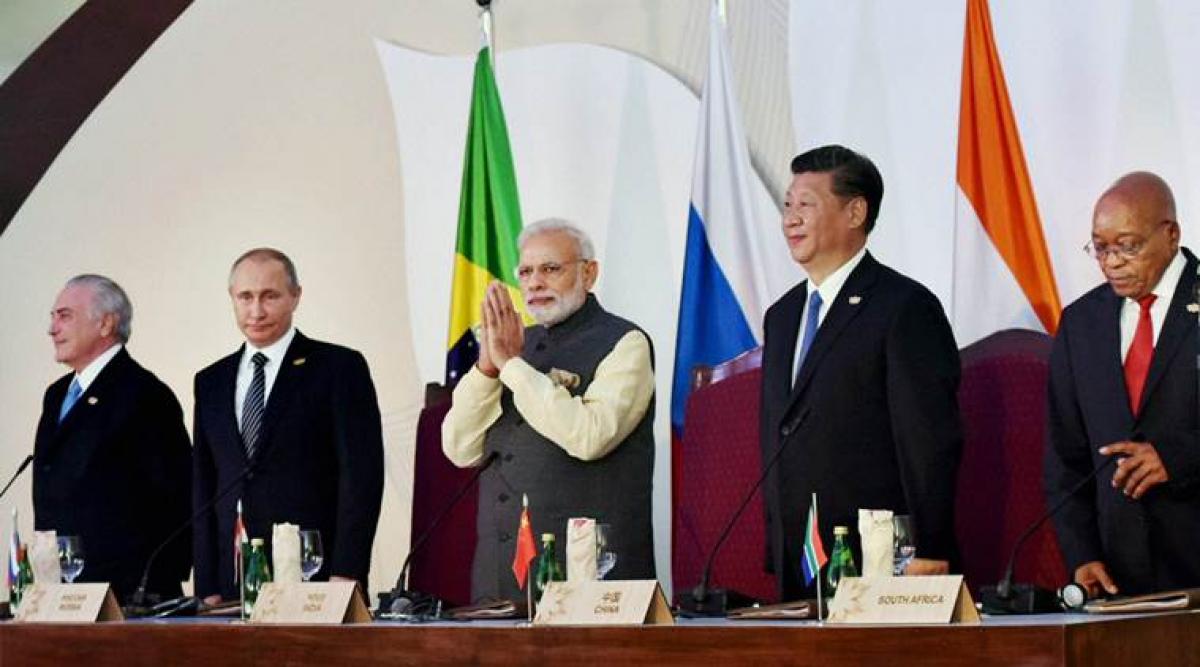Live
- RG Kar protest: Junior doctors to render medical services, carry out hunger strike in parallel
- Traffic Violators Counseled by Nagarkurnool Police
- Bathukamma Celebrations at Government Boys Junior College
- I Will Stand by the Mudiraj Community - MLA Dr. Rajesh Reddy
- Mission Bhagiratha DEE Hemalatha Distributes Certificates to Water Assistants in Achampet
- Elderly Man Dies Suddenly at Bus Stand
- DMK MP Wilson's conduct a threat to judicial impartiality and independence: BJP
- Lightning strikes claim nearly 300 lives in Bangladesh
- Haryana polls: Sohna records highest voting at 68.6 pc, Gurgaon registers lowest turnout
- Multiple attacks in Syria result in casualties
Just In

Asserting that results of the reforms undertaken by his government were visible, Prime Minister Narendra Modi on Sunday said the country has transformed into one of the most open economies in the world with a strong growth rate.
Asserting that results of the reforms undertaken by his government were visible, Prime Minister Narendra Modi on Sunday said the country has transformed into “one of the most open economies” in the world with a strong growth rate.
“We have undertaken substantial reforms in the past two years to streamline and simplify governance, especially in doing business. The results are clearly visible,” Modi told the Brics Business Council as part of the eighth summit of the five-nation grouping here.
“We have moved up in almost all global indices that measure such performances. We have transformed India into one of the most open economies in the world today. Growth is strong and we are taking steps to keep the momentum going,” the Prime Minister said.
The Modi government has undertaken a slew of reforms like passing the indirect taxation legislation on goods and services tax which seeks to make the country a single market, passing the Bankruptcy Code which will help troubled/failed companies find an exit, and through flagship programmes on the administrative front like the ‘Make in India’ and the ‘Digital India’ initiatives.
All this has had India’s ranking in ease of doing business go up by multiple notches in a year to 39 as per the latest ranking by the World Bank.
The government has also been consistently raising caps on foreign holding in domestic companies in a slew of sensitive sectors like defence insurance and defence.
According to Finance Ministry, as many as 90 per cent of the key economic sectors where FDI is allowed are on the automatic route, which help foreign companies save lots of time to start their operations.
Even though the June quarter growth slowed to 7.1 per cent from 7.6 per cent in the previous quarter, Asia’s third largest economy continues to be the fastest growing one in the world and policymakers are expecting the GDP expansion for the current fiscal year to come in at 7.6 per cent and accelerate further in coming years to 8 per cent going forward.
Modi said there were a slew of “matching priorities” between the business council and that of his administration, including dismantling trade barriers, promoting skills development, establishing manufacturing supply chains and infrastructure development.
On achievement of BRICS, Modi said the footprint of intra-BRICS engagement has expanded over time to include large areas of economic activity.
“The scope of our partnership today stretches from agriculture to industry and innovation; trade to tourism; environment to energy; films to football; skill development to smart cities; and from fighting corruption and money laundering to securing our societies,” he said.
He said the establishment of New Development Bank and the Contingency Reserve Arrangement are “indeed signature achievements”.
“In a world of new security challenges and continuing economic uncertainties, BRICS stands as a beacon of peace potential and promise,” he said.
The Prime Minister said the process of institution building in BRICS must continue to remain a focus area.
“The institutions that we build must support the development of our countries and regions. They should enable greater flexibility and freedom, and offer wider choices in responding to our developmental priorities,” he said.
He further said, “We look forward to translating into reality the idea of a BRICS Credit Rating Agency.”
The Prime Minister said there was also a clear need to build norms, create structures and pool our capacities to stop tax evasion, and fight against black money and corruption.
“Our agencies must also build mechanisms of information sharing to bring to justice the tax offenders and money launderers. BRICS should push for empowering the global governance institutions to reflect today’s reality,” he said.
Modi said transforming the quantum and quality of trade and investment should be a priority.
“In 2015, intra-BRICS trade stood at about USD 250 billion. We should set ourselves a target to double this number to USD five hundred billion by 2020.
“This requires businesses and industry in all five countries to scale up their engagement. And, for governments to facilitate this process to the fullest. Our agreement on a tax and custom cooperation framework is a good start,” he said.
He said the BRICS New Development Bank must play an active role to support this objective.
“Our cooperation must grab this opportunity to transform the basic structure of our economies.
“In the world we inhabit today, security and counter-terrorism cooperation is necessary if we are to secure the lives of our citizens,” he said.

© 2024 Hyderabad Media House Limited/The Hans India. All rights reserved. Powered by hocalwire.com







